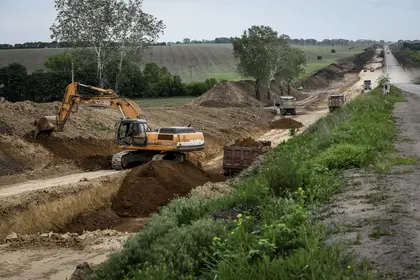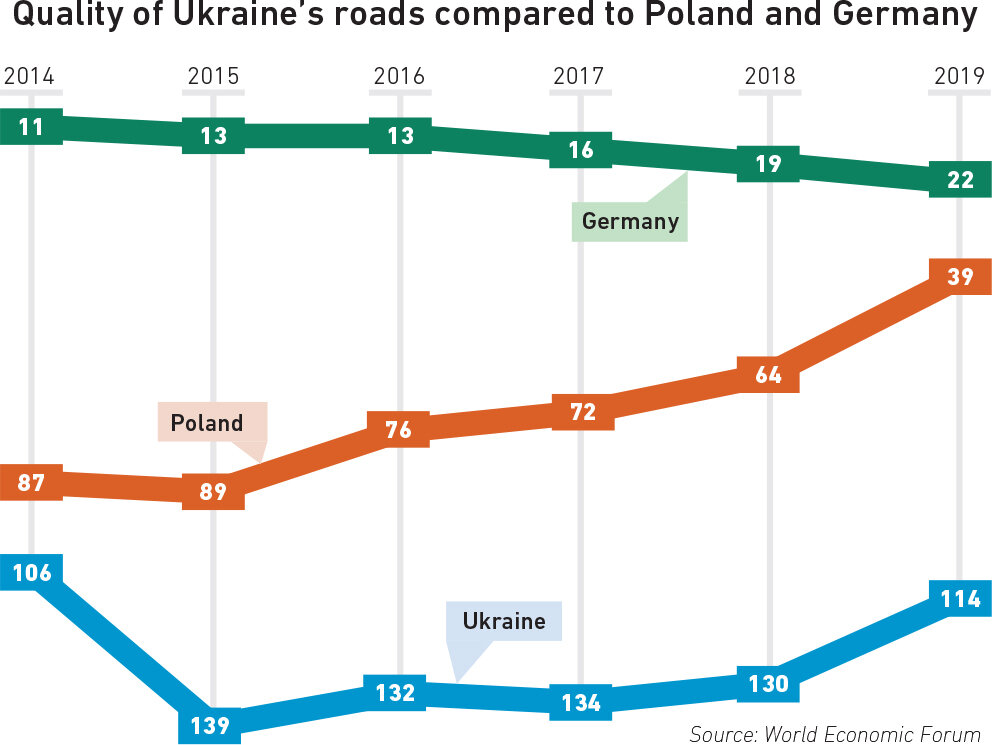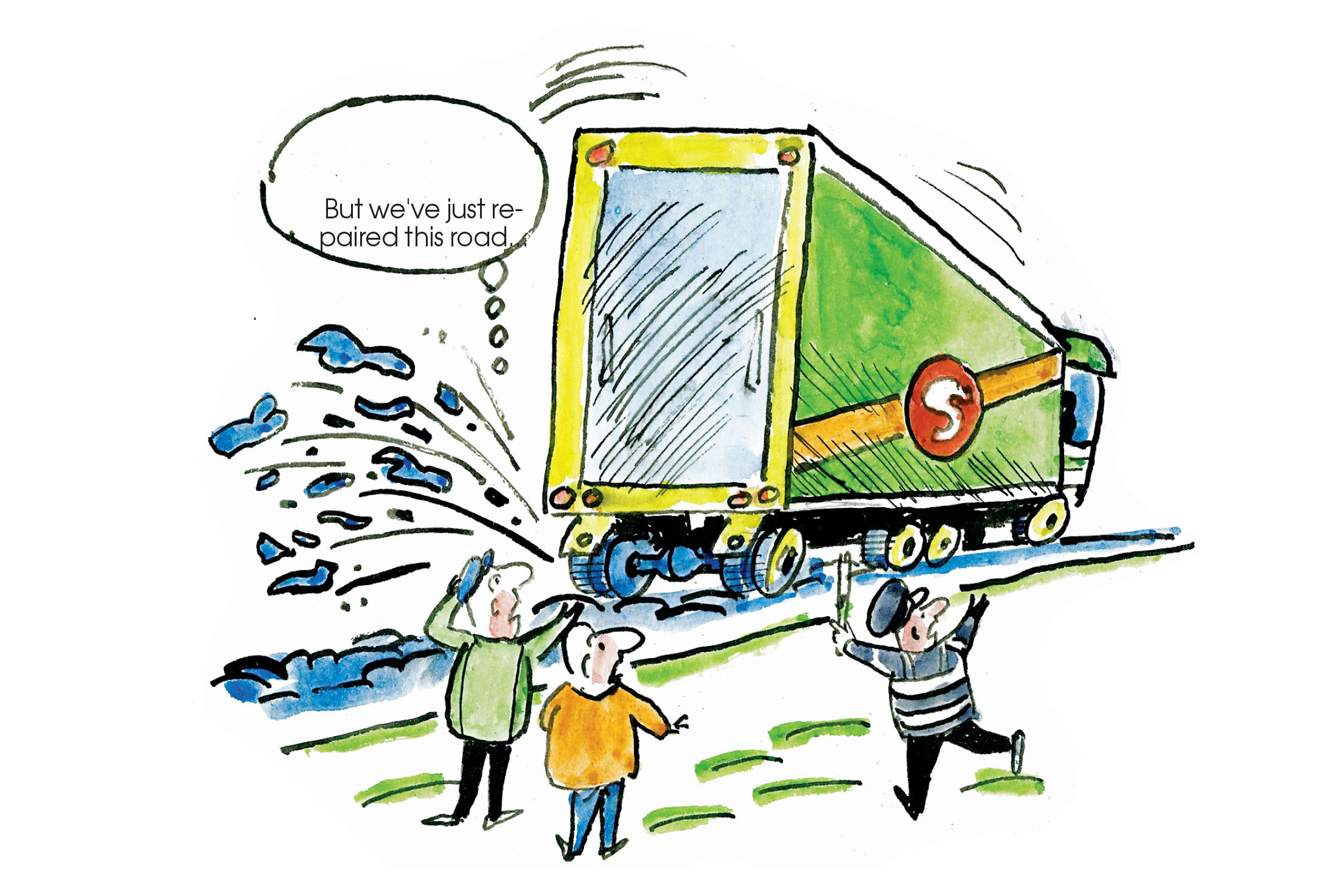Ukrainian President Volodymyr Zelensky made it clear at a press conference in May that he wants to be “remembered as the president who built good roads in Ukraine.”
The roads in Ukraine are among the worst in the world, and Zelensky’s government has started a large-scale infrastructure program called Big Construction, designed to improve the quality of roads.
According to the program, at least 6,500 kilometers of roads must be built or repaired nationwide. In addition, hundreds of kindergartens, schools, stadiums, bridges and new hospitals will also be repaired or built under Big Construction.
As of June, the State Road Agency, or Ukravtodor, has already begun repairing over 3,000 kilometers of roads and the state plans to fulfill the $2.8-billion program by the end of 2020.
Yuriy Golik, an expert in road infrastructure and a former coordinator of the project until June 23, said that this approach — to strike while the iron’s hot — is 100% deliberate. “Build quickly, don’t stretch it out for several years” is his motto, Golik told the Kyiv Post.
Golik said a damaged road should be repaired quickly and the whole process should take no more than a year. It should not be separated into pieces of, say, five kilometers to avoid “bit by bit” reconstruction, when parts of one road have different technical specifications, a ubiquitous practice in Ukraine.
However, experts warn this approach is too enthusiastic. Konstantin Fastovets, head of research at Adamant Capital, said it will “be very difficult” to finance this ambition, and that it will likely receive less money in the end, which could endanger the program.
Expensive things
Ukravtodor is the state agency that’s responsible for ensuring the program is completed.
In January, the state said it needed $3.2 billion for the program. But since then, the sum has grown, as the government keeps adding more objects to the project.
The coronavirus pandemic and the global financial crisis have raised the costs, too.
A lack of funds has forced the government to cut state budget spending for 2020, but the road construction and repairs budget remained untouched — for now.
The Ukrainian government allocated $2.8 billion for the project budget, and $2.7 billion will be used exclusively to build and repair roads. Meanwhile, international donors like the European Bank for Reconstruction and Development (EBRD) and the World Bank pledged to loan Ukraine $160 million for the program. Ukravtodor will also receive about $700 million — in the form of loans — from state banks.
Ukravtodor doesn’t collect this money, though. It’s all managed by another state service, the Road Fund.
But the Road Fund doesn’t give all the money to Ukravtodor. For now, it has allocated $1.9 billion to the state agency: $1.1 billion for the roads of state importance and $850 million for local ones. The rest of the money — $900 million — the fund leaves for itself to repair roads too, a move that’s supposed to diversify the financing of the program and ensure that progress is made.
But even though this amount of money was supposed to satisfy the initial program, prices have grown and the economy has shrunk. To build the roads as planned, the state needs more money.
In order to cover the growing expenses of the program, the current government led by Prime Minister Denys Shmyhal announced that it would give the Fund an additional $2.9 billion, which the government got from a legal dispute with Russian gas company Gazprom.
The Stockholm Arbitration Court awarded the sum to Ukraine in late 2019 after a long-running dispute between Gazprom and Ukrainian state-owned energy company Naftogaz, at the end of which Gazprom agreed to pay for gas transit through Ukrainian territory.
The total sum both Ukravtodor and Road Fund will receive in the end is $4.4 billion, while the surplus will be used for the next years.
Roadmap for years to come
Fixing roads is a pressing issue in Ukraine. According to a survey by the World Economic Forum, Ukraine ranked 114th out of 141 countries regarding the quality of roads.
In total, Zelensky pledged to repair 24,000 kilometers of roads during his 5-year tenure, until 2024.
The overall project, covering all the country’s territory, is the equivalent of re-paving the 500-kilometer road from Kyiv to Odesa 48 times.
And some progress has already been made. The state has already completed a 25-kilometer highway along that Kyiv-Odesa road in June. Kirill Timoshenko, deputy head of the President’s Office, praised that accomplishment, saying that the “program is gaining momentum.”
Ukravtodor has already started building and repairing an extensive motorway network. The agency plans to widen roads from the two lanes common in Ukraine to four in 2020 to make highways safer and faster to drive along. For example, a 477-kilometer journey from Kyiv to the city of Dnipro in southeast Ukraine will take two hours less — down from 6.5 hours to 4.5 hours — the agency estimates.
Ukravtodor also began installing weigh-in-motion systems on the surface of 200 roads to fight against overloaded trucks which destroy the roads when they drive in places not designed for heavy vehicles.
However, despite the measures taken by the state, overloaded trucks continue to damage roads, Zelensky said in a video published on June 23.
He called the offenders “bastards” in a private chat on messenger Viber where truck drivers were discussing how to escape fines on overloaded trucks.
“They are overloaded, they don’t care that the state spends about $1 million on one kilometer of the roads,” Zelensky said.
And it’s not the only case when Zelensky pays such close attention to everything connected to his Big Construction program.
In June, for example, despite the ongoing strict quarantine in Ukraine, he went to Khmelnytsky, a city 300 kilometers west of Kyiv, to inspect M12, a 140-kilometer highway, which goes from western Ukraine to central Ukraine.
Zelensky also inspected the derelict Khmelnytskyi Airport, which hasn’t operated for the last 20 years. The president added the airport to the Big Construction program.
And the government keeps adding items to the project. A map published in March by Golik revealed that 157 kindergartens, 246 schools, 170 sports facilities, 422 clinics and 212 intensive care hospitals have been added to the initial list.
Inspired to fulfill Zelensky’s promise to improve the roads, the government, apart from Big Construction, will also find foreign private companies that want to build the first private highways in this country. One such project — which is already in the works — is the 84-kilometer Lviv–Poland highway.
A foreign investor agreed to build the road at its own expense and, in turn, will own this highway for 49 years and make money from charging drives to use it.
But plans to attract foreign investors may be overly optimistic. According to analyst Fastovets, the investor for the Lviv-Poland highway is more of an exception than a rule, and it is difficult to attract foreign capital to such an unstable economy as Ukraine.
“Ukraine’s investment climate is not an easy sell,” he said.
You can also highlight the text and press Ctrl + Enter






